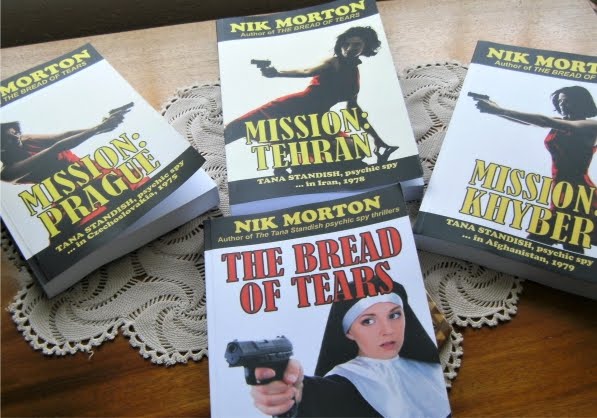Alan
Titchmarsh’s memoir Nobbut a Lad – A Yorkshire
childhood was published in 2006.
Titchmarsh
is familiar to UK television viewers through his gardening and other programmes.
He was born in May 1949 – so to me he is a contemporary and many of his
reminiscences echo experiences I enjoyed in childhood. His novels show that he can
write as well as attend to horticulture, and this endearing and at times
touching book is enlivened not only with his good writing style but also with a
wry sense of humour.
So
this is his story – ‘Not that it was without incident or occasional tragedy. But
that’s growing up. And growing up, even in the best of all possible worlds, is
a confusing thing to have to do’ (p9). This definitely is not a 'misery memoir'.
He
was brought up proper. ‘At all times men walked on the outside of the pavement,
ladies on the inside. I still do, even though it does sometimes cause confusion
when after crossing the road, the woman I am walking with discovers that I’m
not where I was’ (p15). [I used to do the same. I suspect the courtesy stems
from those days when roadways were plagued by puddles and the wheels of passing
carriages were liable to splash pedestrians. I don’t do it with my wife Jen; I
always walk on her right-hand side, it’s her good ear. So part of the time I’m
the gentleman of old, at others, not!]
It
was the time of steam trains. On one jaunt to London with his parents he found
himself on the famous Mallard. He
chatted with the driver and said ‘I want to be an engine driver’ to which the
driver replied, ‘Aye, but you’re nobbut a lad.’ Alan said firmly, ‘When I grow
up I mean’ (p141). His career path took a different turn, of course, like so
many others who wanted to be train drivers or astronauts or even cowboys!
He
lovingly describes many amusing anecdotes, sometimes against himself, and is
never malicious. At one time the family had an upright piano in the parlour and
Alan determined to learn to drive a car with the instrument’s help. He needed a
walking stick and a flowerpot. He turned the flowerpot upside down and stuck
the stick in the drainage hole in the pot; this served as the gear-lever. Then
he’d use the three foot-pedals of the piano as the accelerator, clutch and brake.
Until his father had enough of Alan’s revving sounds and suggested ‘Put the car
in the garage and go to bed’ (p249).
‘Impressing
my parents was more important to me than almost anything else. It seemed a way
of repaying their confidence and the energy and effort they’d put into bringing
us up during those tough years after the war’ (p325).
‘Since
being a lad, I’ve had a love affair with horses – in paint and in the flesh. The
works of George Stubbs and Sir Alfred Munnings thrill me like no other. Dogs
command affection, cats command attention, but horses command respect’ (p271) [In
his 2008 novel Folly he actually has Munnings
as a character].
‘Collecting
things was something we all felt driven to do; there was some kind of security
in ownership of a collection, some kind of status. In leaner weeks we’d search
through the dustbins at the back of the bus garage... We’d pull out cigarette
packets and tear off the front and back covers so that each became a crude
playing card. With these we’d play snap, and feel as rich as a king when we
scooped a whole pile of them’ (p292).
‘My
pocket money amounted to one shilling. It never changed for years, it seemed. It
didn’t buy much, but most of it went in Woolworths on seeds, or construction
kits...’ (p295).
‘The
fact that I failed my eleven-plus came as no surprise to anybody, least of all
me... I can recall that feeling now – the feeling of trying to knit fog. I
caught up in the years that followed; but at the age of eleven it is no
consolation to know that you are a late developer’ (p300).
‘I
should have been better at science, bearing in mind my future, but Miss Sutcliffe
– known as “the Improper Fraction” (top-heavy) – was a loud woman who
frightened the life out of me. When she bawled at you, “Acids must be respected!”
you felt obliged to scatter the vinegar on to your fish and chips with
particular care’ (p304).
These
snippets don’t do the book justice. Alan Titchmarsh has a sharp eye for detail –
also evinced in his novels – and here provides the reader with vivid recall of people
and times long gone, but not forgotten. Here he shows us the various local characters
and teachers who became powerful influences in his early life.
Also
included are photographs of his family, which many of us can relate to in the
style and composition. Plus the author has inserted several line drawings to
illustrate certain events and things.
Nostalgia
may not be what it used to be, but it’s here in this book in spades!


























